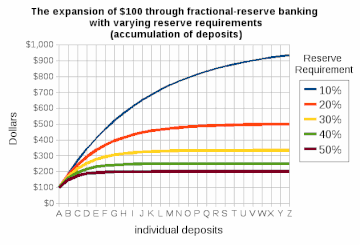"Ethics of Fractional Reserve Banking: Legitimate Establishment or Opportunistic Crime"
** Basic Meaning and Rational **
Fractional Reserve Banking is a type of banking whereby the bank retains only a fraction of the customer's deposits as reserves. The bank lends out most of the deposited funds, keeping only a fraction (called the reserve ratio) of the quantity of deposits as reserves of cash and coin in the bank's vaults or as deposits at the central bank. Some of the money lent out is subsequently deposited with another bank, increasing deposits at that second bank and allowing further lending.
Since most people do not need to use all their money all the time, banks lend out that money, to generate profit for themselves.
** Recount of the Process **
The reserve ratio for US banks is approximately 10%.
Given a $100 deposit a bank can loan $90 to a borrower to cover a payment debt.
Conceivably, the receiver of the payment could deposit the $90 into a bank, after which $81 could be loaned to a borrower to cover some other debt.
The deposit and lending process could continue until the $100 is exhausted and only $100 remains in the banks.
Although no new money was physically created in addition to the initial $100 deposit, new commercial bank money is created through loans.
When the reserve rate is 10%, as in the example above, the maximum amount of total deposits that can be created is $1000 and the maximum increase in the money supply is $900.

** Legitimate Establishment of Opportunistic Crime **
Assuming the maximum benefit for simplicity, given a $100 deposit banks have the potential to earn - nearly guaranteed - usury interest on $900 ! !
Had the original $100 been tagged and the $90 loaned been tied to the tag so that it could not be loaned repeatedly thereby creating imaginary money, then fractional lending may represent a legitimate establishment.
As it stands, the earnings volume is excessive gratuity relative to the ethics of source entitlement, which represents a moral hazard of fiduciary trust by government and a disproportionate marginal revenue product according to moral expectation.
** Marauder Perks **
Five Groups Who Should be Mad at Wall Street by BRETT ARENDS
"5. Anyone investing in banks
You have to laugh when people slam "greedy" Bank of America. Have you seen the stock price lately? For stockholders, this is a nonprofit. The only ones making money are the management and staff.
It's the same at all the other banks. In the past five years, public filings show, the employees of Goldman Sachs have pocketed $80 billion in pay and benefits, including bonuses and other goodies. Over the same period, stockholders have lost $25 billion."
